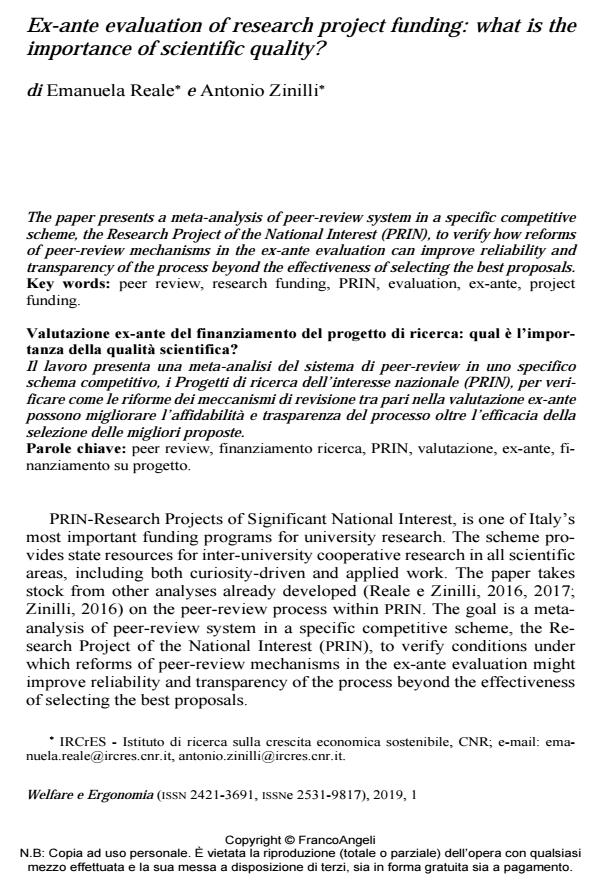Ex-ante evaluation of research project funding: what is the importance of scientific quality?
Journal title WELFARE E ERGONOMIA
Author/s Emanuela Reale, Antonio Zinilli
Publishing Year 2020 Issue 2019/1
Language English Pages 13 P. 29-41 File size 194 KB
DOI 10.3280/WE2019-001004
DOI is like a bar code for intellectual property: to have more infomation
click here
Below, you can see the article first page
If you want to buy this article in PDF format, you can do it, following the instructions to buy download credits

FrancoAngeli is member of Publishers International Linking Association, Inc (PILA), a not-for-profit association which run the CrossRef service enabling links to and from online scholarly content.
The paper presents a meta-analysis of peer-review system in a specific competitive scheme, the Research Project of the National Interest (PRIN), to verify how re-forms of peer-review mechanisms in the ex-ante evaluation can improve reliability and transparency of the process beyond the effectiveness of selecting the best proposals.
Keywords: Peer review, research funding, PRIN, evaluation, ex-ante, project funding.
- Arensbergen P. and van Besselaar P. (2012). The selection of scientific talent in the allocation of research grant. Higher Education Policy, 25: 381-405.
- Hornbostel S. (2001). Third party funding of German universities: an indicator of research activity? Scientometrics, 50. DOI: 10.1023/A:1010566916697
- Lamont M. (2009). How professors think. Inside the curious world of academic judgment. Cambridge: Harvard University Press.
- Langfeldt L. (2001). Decision-Making constraints and processes of grant peer review, and their effects on the review outcome. Social studies of Science, 31: 820-841. DOI: 10.1177/030631201031006002
- Langfeldt L. (2006). The policy challenges of peer review: managing bias, conflict of interests and interdisciplinary assessments. Research Evaluation, 15(1). DOI: 10.3152/147154406781776039
- Laudel G. (2006a). The ‘quality myth’: Promoting and hindering conditions for acquiring research funds. Higher Education, 52: 375-403.
- Laudel G. (2006b). The art of getting funded: how scientists adapt to their funding conditions. Science and Public Policy, 33: 489-504. DOI: 10.3152/147154306781778777
- Reale E. e Zinilli A. (2016). La valutazione dei Programmi di ricerca di Interesse Nazionale PRIN: quali criteri usa la comunità scientifica? RIV-Rassegna Italiana di Valutazione, 64: XX.
- Reale E. and Zinilli A. (2017). Evaluation for the allocation of university research project funding: can rules improve the peer review? Research Evaluation, 26(3): 190-198.
- Zinilli A. (2016). Competitive Project Funding and Dynamic Complex Networks: Evidence from Projects of National Interest (PRIN). Scientometrics, 108: 633-52.
Emanuela Reale, Antonio Zinilli, Ex-ante evaluation of research project funding: what is the importance of scientific quality? in "WELFARE E ERGONOMIA" 1/2019, pp 29-41, DOI: 10.3280/WE2019-001004